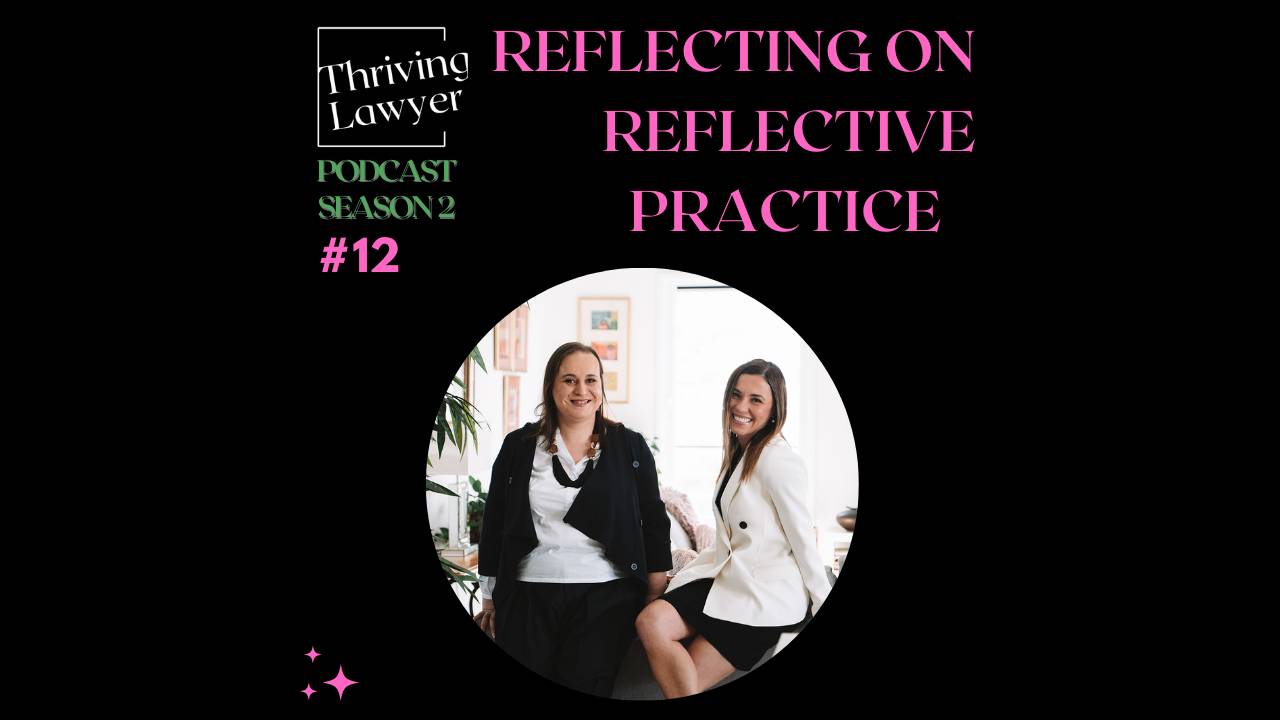Reflecting about Reflective Practice: what we learnt from interviewing Prof. Christian Van Nieuwerburgh and David Love
Jun 18, 2025
Since our podcast episode interviewing Professor Christian Van Nieuwerburgh and David Love, Carla and I have continued to reflect on the relevance of reflective practice.
As lawyers, we often find ourselves caught in the whirlwinds of deadlines, demanding clients, and what can often be a relentless pursuit of perfection. It’s no surprise that reflective practice can feel like a luxury we simply cannot afford. Yet, learning to integrate reflection into our professional lives might be the missing piece to enhancing both performance and wellbeing.
Indeed, its no surprise that in their recent systems theory of lawyer wellbeing, the Victorian Legal Services Board and Commissioner identified reflective practice as key to wellbeing.
The Power of Reflection
Since our recent interview, I've become convinced that adopting reflective practice as part of our practice as lawyers truly has transformative potential. It provides us the opportunity to pause, consider, evaluate and recalibrate strategies and approaches across our practice.
By taking the time to engage in such practice we can unlock new perspectives and identify real opportunity for growth. It can be seen as a form of self-coaching.
This is so valuable when the challenge that lawyers often has is that we get stuck in the week to week daily grind. We end up feeling like we are on that proverbial hamster wheel, going around and around in circles.
In a recent interview with David Love and Prof Christian Van Nuremberg, Carla and I delved deeper into the practical elements of reflective practice and its significance in achieving a balanced professional life.
Creating Space for Reflection
One key takeaway from our conversation with David and Christian is the importance of deliberately creating space for reflection.
Allocate just 10–20 minutes a day, even if that means starting with a short-term commitment.
his dedicated time is where you set intentions, clarify desired outcomes, and plan actionable steps. The insights shared emphasized having a clear purpose: "What do I want to achieve from this self-reflection?"
Mindful Reflections Versus Rumination
Another key takeaway is that not all reflections are equal. How we go about our reflective practice is critical.
A common pitfall is slipping into rumination, which can be detrimental rather than beneficial. As discussed in the podcast, reflection should be solution-focused and aimed at generating insights, as David and Christian proposed in their cycle of effective reflective practice.
By highlighting our own agency and control, we transform reflection from a cycle of self-criticism to a proactive tool for change.
The Role of Self-Compassion
Reflecting on our discussions with our guests, we think that reflecting with self-compassion is absolutely critical to combating perfectionism.
Cultivating self-compassion, as Carla suggests, allows us to view our imperfections as opportunities for growth, rather than shortcomings. It enables us to embrace our current capabilities while remaining open to learning and improvement.
Action Steps to Begin Reflective Practice
-
Commitment: Start by setting aside specific time for reflection. Consistency over perfection is key.
-
Clarity: Define what you want to achieve through reflection. Set positive intentions for each session.
-
Structure: Use frameworks, like those discussed by David and Christian, to guide your practice – assess outcomes and plan experiments to test new strategies.
-
Compassion: Approach your reflections with kindness. Acknowledge where you are today and identify steps without harsh judgment.
-
Continual Improvement: Reflect on both successes and areas for improvement to establish an ongoing cycle of growth.
Embracing reflective practice as a core component of your professional life can shift your perspective from merely surviving to thriving. By prioritizing self-reflection, lawyers can enhance their coping strategies, build resilience, and develop a deeper understanding of their personal and professional aspirations.
If you're ready to take the first steps into this transformative practice, explore more through 'The Thriving Lawyer' podcast (you can listen to the latest podcast above or subscribe via Spotify or Apple Podcasts.
GET YOUR FREE LAWYER'S GUIDE TO THRIVING IN 2025: A sustainable Roadmap for success
Thrive as a Lawyer, at work and in the rest of your life.
We hate SPAM. We will never sell your information, for any reason.

